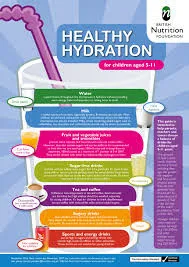Your body depends on water to survive. Every cell, tissue, and organ in your body needs water to work properly. For example, your body uses water to maintain its temperature, remove waste, and lubricate your joints. Water is needed for overall good health.
Path to improved wellness
You should drink water every day. Most people have been told they should drink 6 to 8, 8-ounce glasses of water each day. That is a reasonable goal. However, different people need different amounts of water to stay hydrated. Most healthy people can stay well hydrated by drinking water and other fluids whenever they feel thirsty. For some people, fewer than 8 glasses may be enough. Other people may need more than 8 glasses each day. If you are concerned that you are not drinking enough water, check your urine. If your urine is usually colorless or light yellow, you are well hydrated. If your urine is a dark yellow or amber color, you may be dehydrated. Water is best for staying hydrated. Other drinks and foods can help you stay hydrated. However, some may add extra calories from sugar to your diet. Fruit and vegetable juices, milk, and herbal teas add to the amount of water you get each day. Even caffeinated drinks (for example, coffee, tea, and soda) can contribute to your daily water intake. A moderate amount of caffeine (200 to 300 milligrams) is not harmful for most people. This is about the amount in 2 to 4, 8-ounce cups of coffee. However, it’s best to limit caffeinated drinks. Caffeine may cause some people to urinate more frequently, or feel anxious or jittery.
Water can also be found in fruits and vegetables (for example, watermelon, tomatoes, and lettuce), and in soup broths.
Sports drinks can be helpful if you are planning on exercising at higher than normal levels for more than an hour. It contains carbohydrates and electrolytesthat can increase your energy. It helps your body absorb water. However, some sports drinks are high in calories from added sugar. They also may contain high levels of sodium (salt). Check the serving size on the label. One bottle usually contains more than one serving. Some sports drinks contain caffeine, too. Remember that a safe amount of caffeine to consume each day is between 200 and 300 mg (milligrams).
Energy drinks are not the same as sports drinks. Energy drinks usually contain large amounts of caffeine. Also, they contain ingredients that overstimulate you (guarana, ginseng, or taurine). These are things your body doesn’t need. Most of these drinks are also high in added sugar. According to doctors, children and teens should not have energy drinks.
If staying hydrated is difficult for you, here are some tips that can help:
- Keep a bottle of water with you during the day. To reduce your costs, carry a reusable water bottle and fill it with tap water.
- If you don’t like the taste of plain water, try adding a slice of lemon or lime to your drink.
- Drink water before, during, and after a workout.
- When you’re feeling hungry, drink water. Thirst is often confused with hunger. True hunger will not be satisfied by drinking water. Drinking water may also contribute to a healthy weight-loss plan. Some research suggests that drinking water can help you feel full.
- If you have trouble remembering to drink water, drink on a schedule. For example, drink water when you wake up, at breakfast, lunch, and dinner, and when you go to bed. Or, drink a small glass of water at the beginning of each hour.
- Drink water when you go to a restaurant. It will keep you hydrated, and it’s free.








